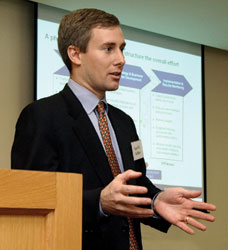Clinic Report
Clinic Cases Aid Immigrants
The Immigration Clinic has been handling
two prominent cases in recent months.
A Permanent Home
In August 1991, a two-year-old boy from
Ethiopia entered the United States with his mother. Since
that time, although his parents and sisters were either
U.S. citizens or lawful permanent residents, he lacked
immigration status. In April 1999, with the assistance
of the GW Law Immigration Clinic, his father filed a preliminary
family-based petition on his behalf so his son could obtain
his lawful status; but the petition languished at the
Immigration and Naturalization Service for nearly five
years. In February 2004, after the case was publicized
in The Washington Post, the petition was approved. Next,
the young man had to apply to an immigration judge for
his lawful permanent residence and turned to GW Law’s
clinic for help.
The young man, now a senior in high
school, testified April 15 on behalf of his application
for lawful permanent residence in the United States in
the Arlington, Va., courtroom of Judge John M. Bryant.
Bryant granted the young man’s application and praised
the work of his lawyer, GW Law student Jennifer E. Mitrick.
Thanks to the years of efforts from students including
Mitrick, James Crescitelli, Lori Katz, Kristine Kassekert,
Matthew Haws, Klaudia Hall, Miranda Tsai, Nicole Dabbous,
Betsy Young, Sara Vins, and Sanford Holmes, the young
man will be eligible to naturalize in 2010.
Seeking Asylum
In Moscow in January 1996, a Russian
man was leaving a metro station with a friend, a U.S.
citizen employed by the International Monetary Fund on
a visit to Moscow, when they were stopped by the police
and asked for identification. After a brief conversation,
the police officer told him that he “smelled too
good to be a guy” and threw his identification back
at him, but it fell to the ground. When he bent down to
pick it up, the police officer kicked him in the face.
This was just one example of the homophobic
persecution that the man suffered throughout his life
in Russia at the hands of family, employers, and the police.
In 2000, he came to the United States and applied for
asylum. He was represented by clinic student Benjamin
Zawacki. At his hearing March 21, 2002, the plaintiff
testified in graphic detail about the persecution inflicted
on him in Russia on account of his status as a gay man.
The friend who witnessed the attack at the metro station
testified at the hearing. The judge ruled that both the
plaintiff and his friend testified credibly—yet
he denied the asylum application and ordered the plaintiff
removed to Russia. The decision was affirmed by the Board
of Immigration Appeals and the Fourth Circuit Court of
Appeals.
This January, the plaintiff was diagnosed
with HIV. Clinic student Mirta Woodall, assisted by clinic
students Manuela Hernández and Jennifer E. Mitrick,
researched, wrote, and filed with the Board of Immigration
Appeals a motion to reopen and a supporting memorandum
of law which argued that the plaintiff should be allowed
to reapply for asylum as his circumstances had changed.
At this time the motion is pending.
Over the years, in addition to this
year’s students, the plaintiff has been represented
by clinic students Juan Carlos Flamand, Andrew Insenga,
Nagasilpa Jujjavarapu, Nura Maznavi, Natalie Norfus, and
Emily Parker, and Betsy Young.
—Alberto Benitez, Immigration
Clinic director
Small
Business, Big Impact
The GW Law School Small Business Clinic,
directed by professor Susan Jones (in partnership with
D.C. Neighborhood Legal Services), hosted a working meeting
May 5 to discuss ways to unite Washington groups dedicated
to advancing small businesses and fostering microenterprise
development and living wage jobs in D.C.

Karl M. Kellner, principal with
Booz Allen Hamilton and a leader of the Harlem Small
Business Initiative, discusses business development
in Washington. |
The keynote speaker was Karl M. Kellner,
a principal with Booz Allen Hamilton and a leader of the
Harlem Small Business Initiative, a volunteer program
founded by President Bill Clinton and the company in 2002.
The project coordinates the volunteer efforts of business
students, community development corporations, and business
consultants who provide technical assistance to community
businesses. As a result of the initiative, participating
businesses have been able to operate more efficiently,
stay in the community, and increase the numbers of their
employees.
“The Clinton Foundation
established HSBI with the goal of providing the best technical
and managerial assistance possible to established small
businesses in Harlem. Small businesses create most new
jobs in America today,” Jones says. “Like
HSBI, our D.C. Working Group is an effort to identify
committed organizations and volunteers who are passionate
and enthusiastic about helping small businesses, promoting
self-employment, and creating good jobs in the District.
“We are also pleased to have partnered
with D.C. Neighborhood Legal Services to host this community
economic development initiative. Our goal is to identify
ways to assist local businesses that are creating jobs
for D.C. residents.”